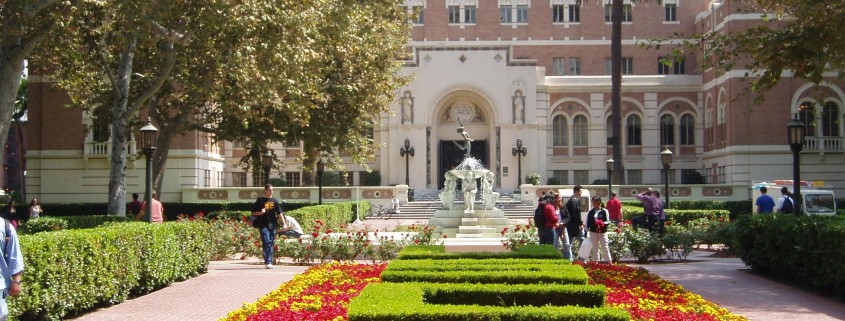COLUMN: USC experience is not always accessible
During both Provost Michael Quick’s tenure as well as the years characterizing USC’s dramatic climb to one of the top schools in the nation, USC has prided itself in actively recruiting students across all socioeconomic backgrounds and advertises its need-blind admissions approach to high school seniors throughout the world. “For every student who really wants a USC experience, we’re going to work to find a way for them to have that experience,” Quick told the Los Angeles Times on Sunday.
However, once the rigorous admissions process is navigated, USC may not actually be able to offer all of its students the same experience. With the many extra costs that come with attending a prestigious institution, there will always be a financial gap between those who have the ability to pay to be a Trojan, and those who don’t.
Every college student has necessities and desires. Equipment such as laptops and textbooks can be expensive even when purchased refurbished or used. There will always be extra costs associated with traveling, whether it be from an internship across town to heading home for the holidays. Fees add up between specific, expensive textbook editions, new student fees, exorbitant parking fees, lab equipment fees, lab fees and more. Even with the financial aid that USC is able to provide to low-income students, there will always be unavoidable costs that a stipend cannot completely cover. These necessities create a small gap between some students and others, but the large expense of many extracurriculars turns the gap into a gorge.
Between Australia, Asia, Latin America, Africa and the Middle East — opportunities to study abroad are definitely not few and far between at USC, where many students spend a semester or even a full year abroad. Most schools and majors at USC have numerous study abroad programs available during any semester, and many of these offer classes with transferable credit once students return to USC. Studying abroad can be an exciting way to spend a summer or to finish a language requirement, but it usually comes at a very high cost. While there are scholarships for study abroad opportunities, some of the programs aren’t available to students who don’t have the opportunity to pay out of pocket. As much as the USC experience may be fairly similar for all students, the chance to travel abroad is not something that’s afforded to everyone.
Moreover, basic social engagements can be costly in college. According to Newsweek, 20 percent of women and 25 percent of men at USC were involved in greek life in 2014. This may not seem like a large number, but the presence of the greek community and the benefits of membership it offers can put pressure on students to join, despite the large extra cost that it entails. Even if a student decides not to rush a sorority or fraternity, living in Los Angeles is expensive, and exploring the city can be very costly. Whether the university can do anything about the rising costs of living and working in Los Angeles is doubtful.
That being said, USC does attempt to provide students with free programming such as Visions and Voices and the Cardinal and Gold events. The rising cost of tuition here does in fact include tickets to see some of the most acclaimed performing artists in Los Angeles, which is not an opportunity given to most college students. This year, the free events will include everyone from William Forsythe to the Los Angeles Philharmonic, and many of them will take place on campus. The Cardinal and Gold events also provide students with exciting opportunities such as a night on the Santa Monica Pier and a trip to a Dodgers game. The events tend to fill quickly, making them not entirely accessible to all the students who may want to take advantage of them.
What makes a fulfilling college experience varies between individuals, and USC does its best to provide all students with a fulfilling experience. However, the harsh reality is that USC is an expensive institution in an expensive city where extra costs seem to accumulate faster than many people can keep up with, and that prohibits all students from having the same opportunities and experiences as other Trojans. Therefore, the idea and notion that USC can somehow provide all of its students with the best “USC experience” — regardless of income — is, unfortunately, one that has not yet manifested today.


What is your point? Everybody is supposed to get a great university experience and education, which they do. The law of Economics is just as powerful as the Law of Gravity. There is only so much money available and making everything accessible and available whether free tuition, books, travel, events would swamp the resources available and is simply not economically sound or possible. Check out a good Economics intro class and you may find out more answers.
Jenda,
Everybody? A university like USC cannot accept everybody. Even the least exclusive colleges in the US, perhaps of poor quality, still cannot accept everybody. And “supposed to get a great university experience?” Where is that requirement written? Some people lack the academic ability to attend college successfully; others lack the interest. Please explain that “everybody is supposed to.”
I am in complete agreement with you, there is no amount of resources (wealth) that can support “Free” education or healthcare …
I believe al of the Trojan Family already receive a great experience and education inside and outside the classroom.